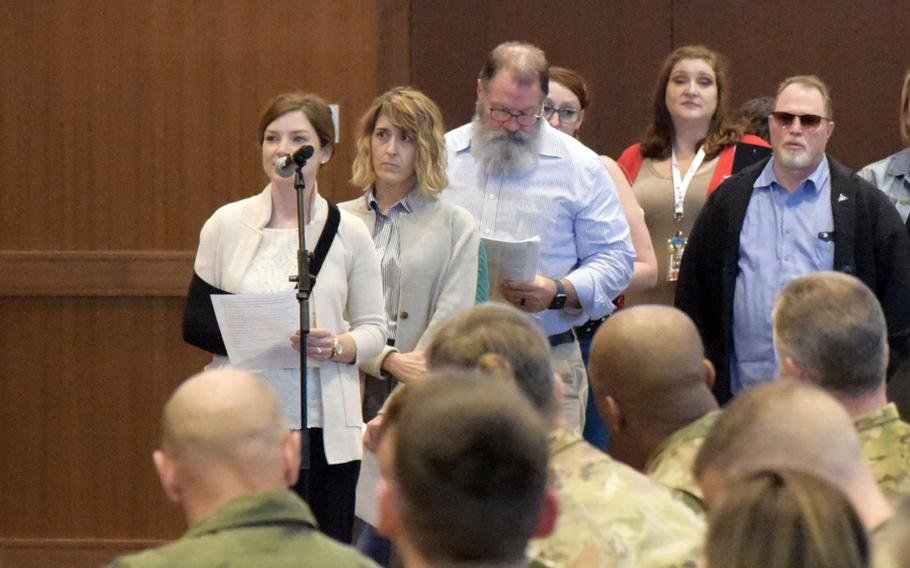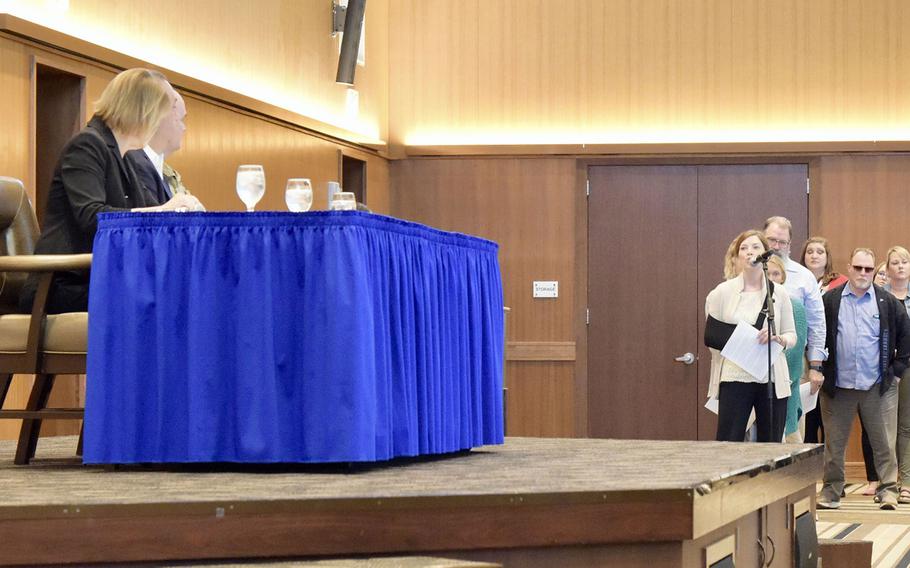Asia-Pacific
Civilian organizers used social media to spark DOD health care revolt in Japan
Stars and Stripes February 9, 2023

Kelly Pretorius, an administrator for the Okinawa Civilian Medical Forum on Facebook, speaks during a health care town hall at Kadena Air Base, Okinawa, Feb. 1, 2023. (Frank Andrews/Stars and Stripes)
TOKYO — Thousands of Defense Department employees in Japan, unhappy that Congress trimmed their access to health care at military hospitals this year, turned out this month at a series of town halls to let the Pentagon hear their dissatisfaction.
Over four days, DOD officials fielded mostly the same questions at six U.S. bases in Japan. They also heard a catalog of personal anecdotes about the consequences of pushing DOD employees and their families to seek medical care from Japanese providers.
Behind the large turnouts, the battery of questions and the persistent messaging lay a network of government employees who used their job talents to organize a grassroots resistance. They compiled briefing materials, studied policy papers and DOD regulations, and found and traded information for their disgruntled constituency.
“These group members are fighting for their own families and their own children,” Amber Malone, a Department of Defense Education Activity teacher at Yokosuka Naval Base, told Stars and Stripes on Feb. 2. “But a lot of them recognize that they are really fighting for those rights and access for people in the future, for anybody who comes here.”

Kelly Pretorius speaks at a microphone about civilian health care during a town hall meeting at Kadena Air Base, Okinawa, Feb. 1, 2023. (Frank Andrews/Stars and Stripes)
Sharing resources
Last year, the Defense Health Agency announced an end to easy access to U.S. military hospitals in the Indo-Pacific region for anyone not covered by Tricare Prime, the top-tier military health care plan. Only space-available appointments for acute medical problems are available to many DOD civilian employees, veterans on lower Tricare tiers and their families.
At the town halls, DOD teachers, contractors and even health care workers peppered Gilbert Cisneros Jr., undersecretary of defense for personnel and readiness, and Seileen Mullen, acting assistant secretary of defense for health affairs, with questions and, at times, jeered their responses.
Malone, 34, of Carmel, Maine, moved in 2021 with her family to Yokosuka Naval Base, homeport of the U.S. 7th Fleet. Last year, she created a Facebook page, the Yokosuka Civilian Medical Forum, seeking help navigating Japan’s health care system.
Malone said she modeled the page after the Yokota Civilian Medical Forum created by Randi Wilson, a Defense Department analyst at Yokota Air Base in western Tokyo.
“Within a couple of weeks, the forum exploded, and I began reaching out to Randi, who initiated the Yokota forums, for resources that could be shared,” Malone said.
Afterward, similar forums popped up for other U.S. installations in Japan, including Kadena Air Base and the collection of Marine Corps installations called Camp Smedley D. Butler on Okinawa.
‘Stonewalled’
Wilson, 33, a native of Austin, Texas, said she became a health care advocate following the February 2021 deaths of co-worker Andrew Hakun and Trevor Balint, the spouse of another co-worker.
Balint, 34, took his own life at Yokota. His family said he was denied mental health care at Yokota despite a history of prior suicide attempts.
Hakun, 52, died of complications of a heart attack that the Yokota base hospital lacked the capability to treat. By the time he reached a Tokyo hospital for treatment he had already suffered irreversible brain damage, according to his medical records.
“A ridiculous amount of friends and co-workers were paying with life and limb because of poor quality health care at the Yokota military treatment facility,” Wilson told Star and Stripes via Facebook Messenger on Feb. 2.
Wilson helped create another Facebook group, Japan Civilian Medical Advocacy, in September. More than 20 people administer the group, now with nearly 1,000 followers.
That group gathers information about health care in Japan and contacts for government officials and organized outreach to congressional representatives, she said.
The advocacy group originated in part from civilian patients’ frustrated efforts to find answers and information through interactive customer evaluation, or ICE, comments to military hospital managers in Japan, and by talking to patient advocates and hospital leadership, Wilson said.
“No one would respond to them,” she said. “This bothered me, and I’m an analyst by trade, my job is to dig through research and documentation.”
Wilson also spent five months on the 374th Medical Group’s Patient Family Partnership Council at Yokota but was asked to leave in December. Membership was limited to Tricare beneficiaries only, said 1st Lt. Danny Rangel, a spokesman for the 374th Airlift Wing. “Those who did not meet this requirement were released from the council,” he said.
Wilson said she felt the council was uninterested in her contributions.
“I felt that my efforts were unwelcome, and they didn’t care if a few patients suffered preventable deaths and injuries every year,” Wilson said. “I felt silenced and stonewalled.”
‘I lose sleep’
Meanwhile, the advocacy group quickly became popular, Wilson said. The group continues to receive daily emails and Facebook messages, and its members are regularly approached in person, she said.
“I can’t praise the group of volunteers that make up the Japan Civilian Medical Advocacy group enough,” Wilson said. “These people churn through a full inbox of heavy, draining pleas for help every day. They pour over government documents at night. And they make it look easy. They will probably never reap the benefits personally.”
On Okinawa, the town halls that started at Yokosuka concluded on Feb. 2 at Camp Foster, where 500 restless people filled the Marine base’s theater.
.jpg/alternates/LANDSCAPE_910/100223MED-ORGANIZERSphoto031.jpg)
Kelly Pretorius, 38, a Dallas native and a pediatric nurse practitioner with a doctorate in nursing from the University of Texas at Austin, is one of several administrators for the Okinawa Civilian Medical Forum on Facebook. (Kelly Pretorius)
Among them was Kelly Pretorius, 38, a Dallas native and a pediatric nurse practitioner with a doctorate in nursing from the University of Texas at Austin. She is one of several administrators of the Okinawa Civilian Medical Forum on Facebook.
Pretorius spends her days studying policy, answering questions, directing people to resources and contacting media outlets, members of Congress and DHA.
“More Americans are absolutely going to die if we do not have access to [military treatment facilities],” she said, adding that reversing the DHA policy is the “responsible, professional and ethical” choice.
Her family’s own stories spurred her to act, Pretorius said. She said a traumatic birthing experience at a Japanese hospital in 2020 requires major reconstructive surgery and her husband was denied care at a Japanese hospital after a diving accident.
"We're leaving in May and I'm not going to lie, I lose sleep every single night over this issue," she told Stars and Stripes on Jan. 30. "I lose sleep from the people that contact me that are desperate for care, and I just sit there and cry and I'm doing my best to try to advocate, and it's literally become a full-time job."